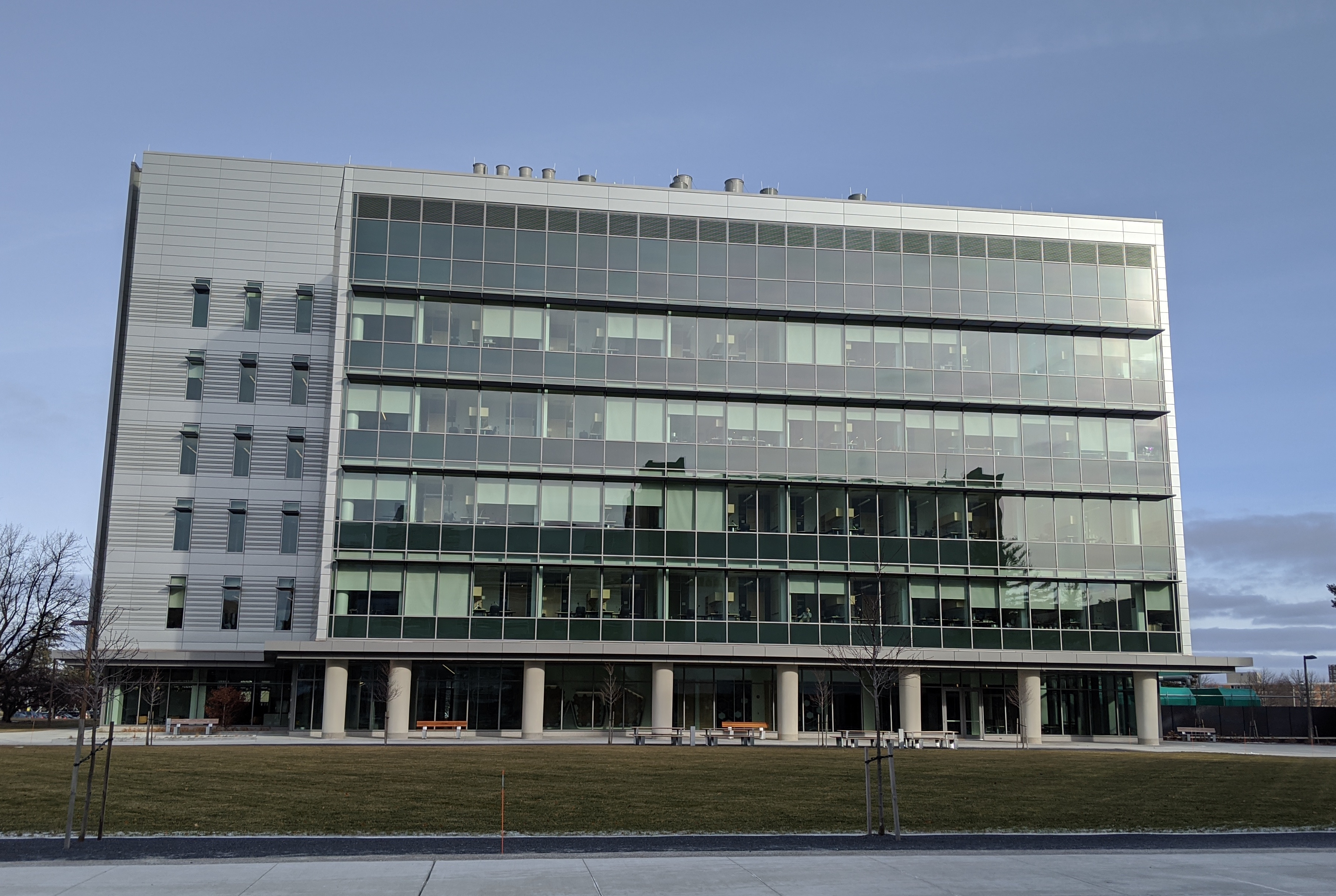October 2019
The lab attended the 49th annual meeting of the Society for Neuroscience in Chicago, IL with poster presentations by Christina, Jessica, Katie, and Remco.
September 2019
Christina presented a poster of her recent work on the involvement of the ventral tegmental area in social play behavior at the 10th IBRO Worlds Congress of Neuroscience that took place from September 21-25 in Daegu, South Korea. Christina was supported by a travel award from the Society for Neuroscience.
Alexa gave a lecture on social behavior in the Neuroscience Summer School on “Understanding the behaviour in animal models”. This summer school was organized by Eelke Snoeren and Roy Heijkoop from the Arctic University of Tromsø in conjunction with the Norwegian Research School in Neuroscience. This summer school took place from September 2-6 at the Sommarøy Arctic Hotel in Tromsø, Norway.
August 2019
Remco and Alexa presented their work at the biannual meeting of the European Behavioural Pharmacological Society in Braga, Portugal (Aug 28-31). Remco presented a poster on the modulation of glutamatergic signaling in the lateral septum by vasopressin with implications for social play behavior. Alexa gave a talk on the function of sex differences in vasopressin and oxytocin in the brain for the regulation of social behavior in the symposium “Brain circuits of prosocial behavior”. This symposium was chaired by Louk Vanderschuren and Marijke Achterberg (both from Utrecht University, Netherlands). Other symposium speakers were Siri Leknes (University of Oslo, Norway), Christian Keysers (Netherlands Institute for Neuroscience, Netherlands), and Marijn van Wingerden (Heinrich Heine University Duesseldorf, Germany).
June 2019
Nick Worley published a paper in the Journal of Neuroendocrinology (Title: Estrogen and androgen receptor activation contribute to the masculinization of oxytocin receptors in the bed nucleus of the stria terminalis of rats). Nick and co-authors (Kelly Dumais, Jingting Yuan, Laura Newman, Andrea Alonso, Tessa Gillespie, Nick Hobbs, Marc Breedlove, Cindy Jordan, Remco Bredewold, and Alexa Veenema) showed that the sex difference in oxytocin receptor binding density in the BNST of rats is established very early (by postnatal day 5) and precedes the sex difference in BNST size (by postnatal day 12). They also show that estrogen receptor and androgen receptor activation is required for full masculinization of the OTR. These findings provide a better understanding of the mechanisms underlying sexual differentiation of the oxytocin receptor. This is relevant because the oxytocin receptor is associated with sex differences in the regulation of social behavior (Dumais et al., 2016). Ultimately, this research may help find potential drug targets involving the oxytocin system to improve social dysfunction in sex-biased neuropsychiatric disorders.
The lab attended the 23rd annual meeting of the Society for Behavioral Neuroendocrinology from June 19-22 at Indiana University in Bloomington, IN. Christina gave a New Investigator Award Talk and Jessica, Katie, and Remco presented posters.
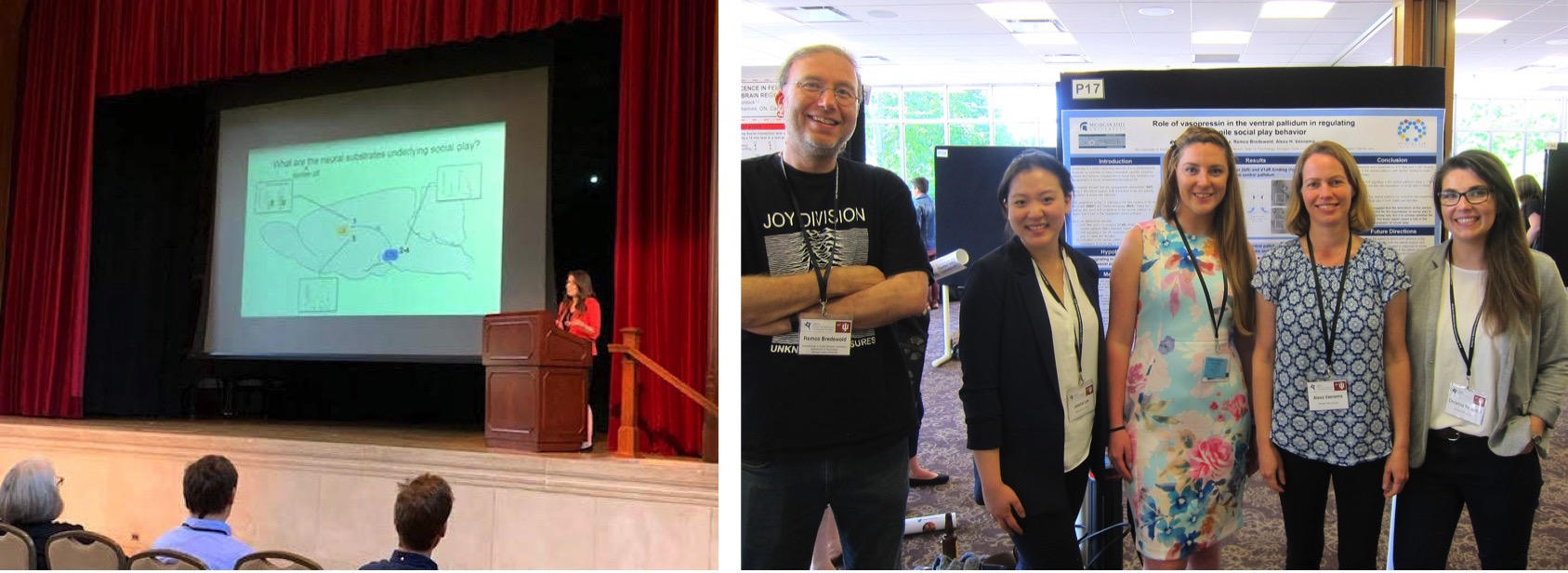
May 2019
Katie received a highly competitive 2-year NSF postdoctoral research fellowship!
Ann Marie received the prestigious 2019-2020 Dean’s Assistantship. Ann Marie was selected because of her excellent qualifications, the scholarly significance of her proposed senior thesis project, and the strength of her proposed research plan!
Christina, Leigha, Katie, Ashley, Ann Marie, and Henry presented posters at the first annual MSU Motivated Behavior Symposium that took place on May 16 and Christina won a poster award!
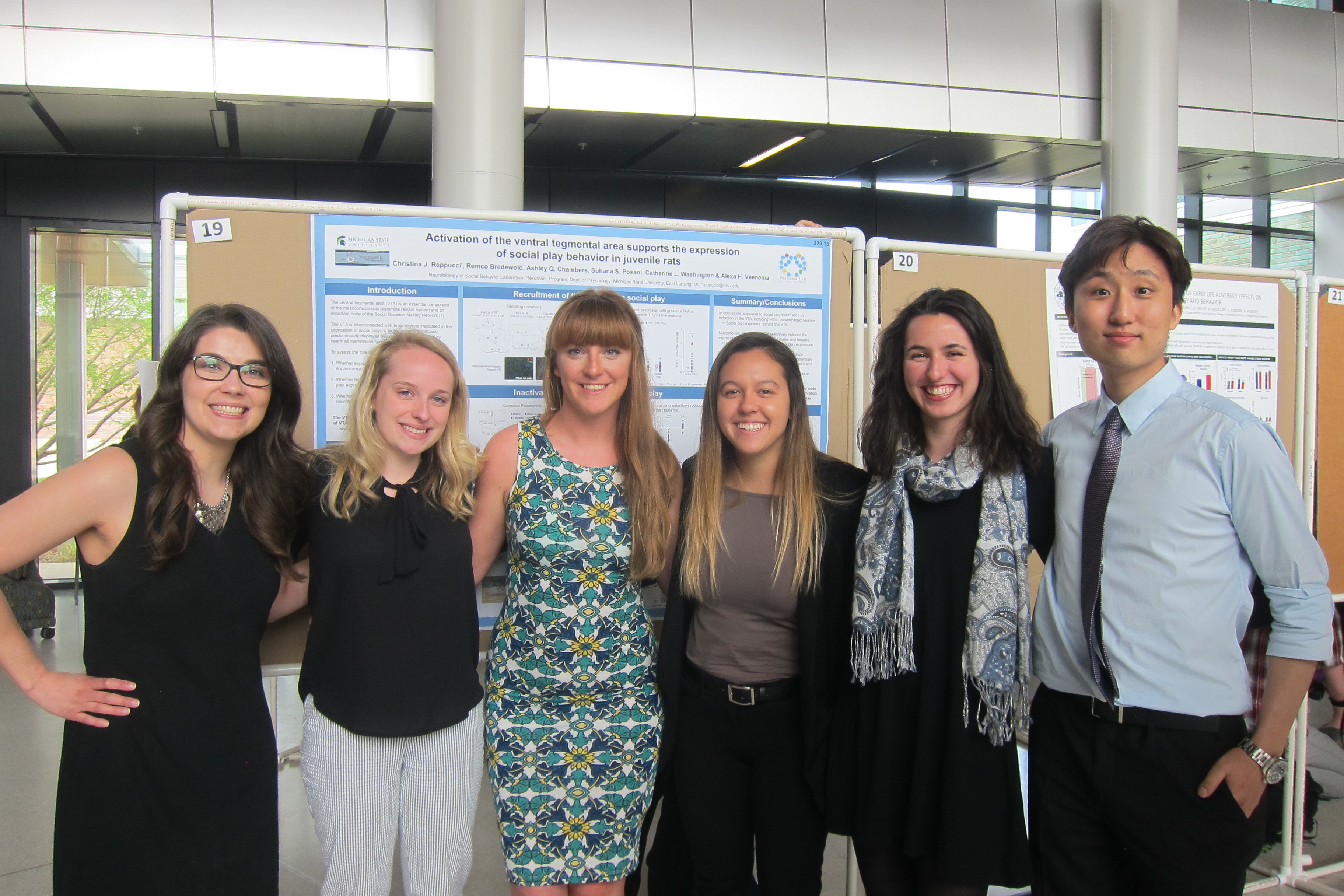
Ann Marie, Christina, and Ashley presented posters at the 49th annual meeting of the Michigan Chapter of the Society for Neuroscience that took place on May 13 at Western Michigan University.
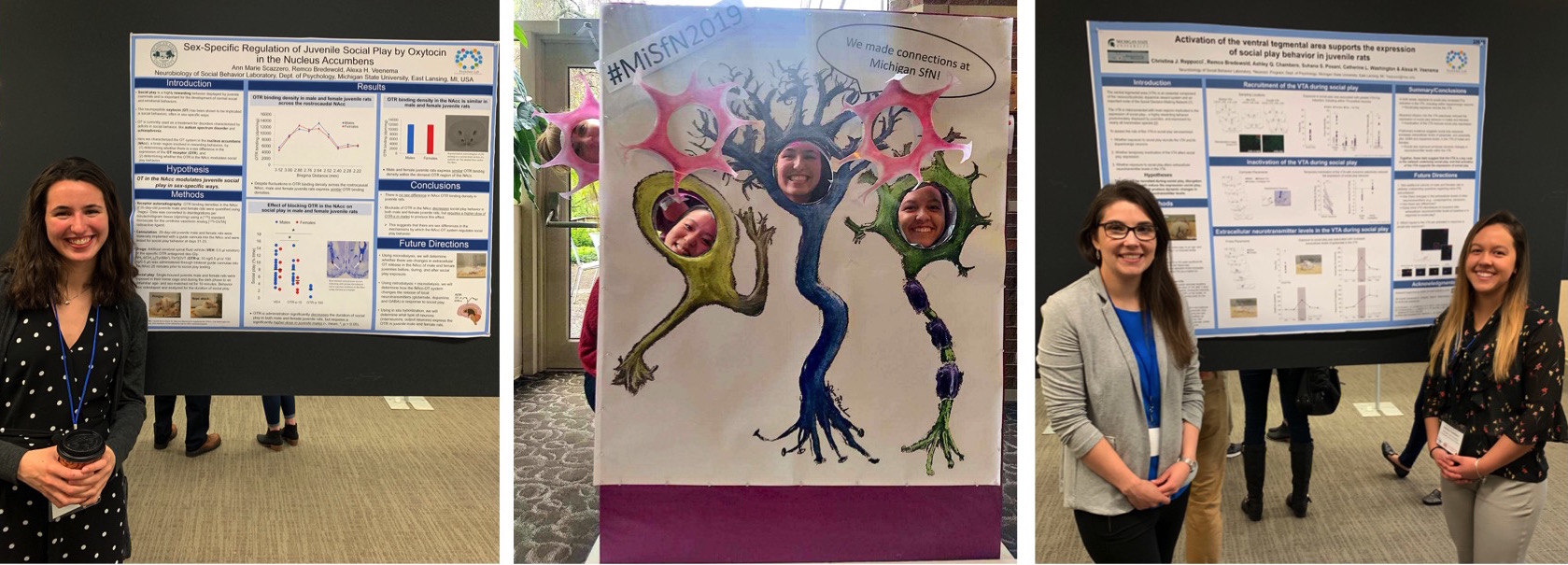
April 2019
April was award month for the Veenema lab with a total of 10 awards: Jessica who received an MSU College of Social Science Research Scholars Award! Ashley and Ann Marie (see photos) won first prize awards for their poster presentations in the category Neuroscience (32 posters) at the MSU Undergraduate Research & Arts Forum! Alexa received the MSU Undergraduate Research Faculty Mentor of the Year Award (see photo with Ashley who nominated Alexa and who accepted the plaque on behalf of Alexa)! Christina won a travel award from the Society for Neuroscience to attend and present at the 10th IBRO Worlds Congress of Neuroscience that will take place in September 2019 in Daegu, South Korea! Ann Marie received the Hymen and Miriam Stein Scholarship to cover living expenses over the summer and senior year while doing research in the lab. Katie received the very prestigious Ford Foundation Postdoctoral Fellowship! Ann Marie, Leigha, and Morgen received MSU Provost Undergraduate Research Initiative Awards to do full time research in the lab over the summer!
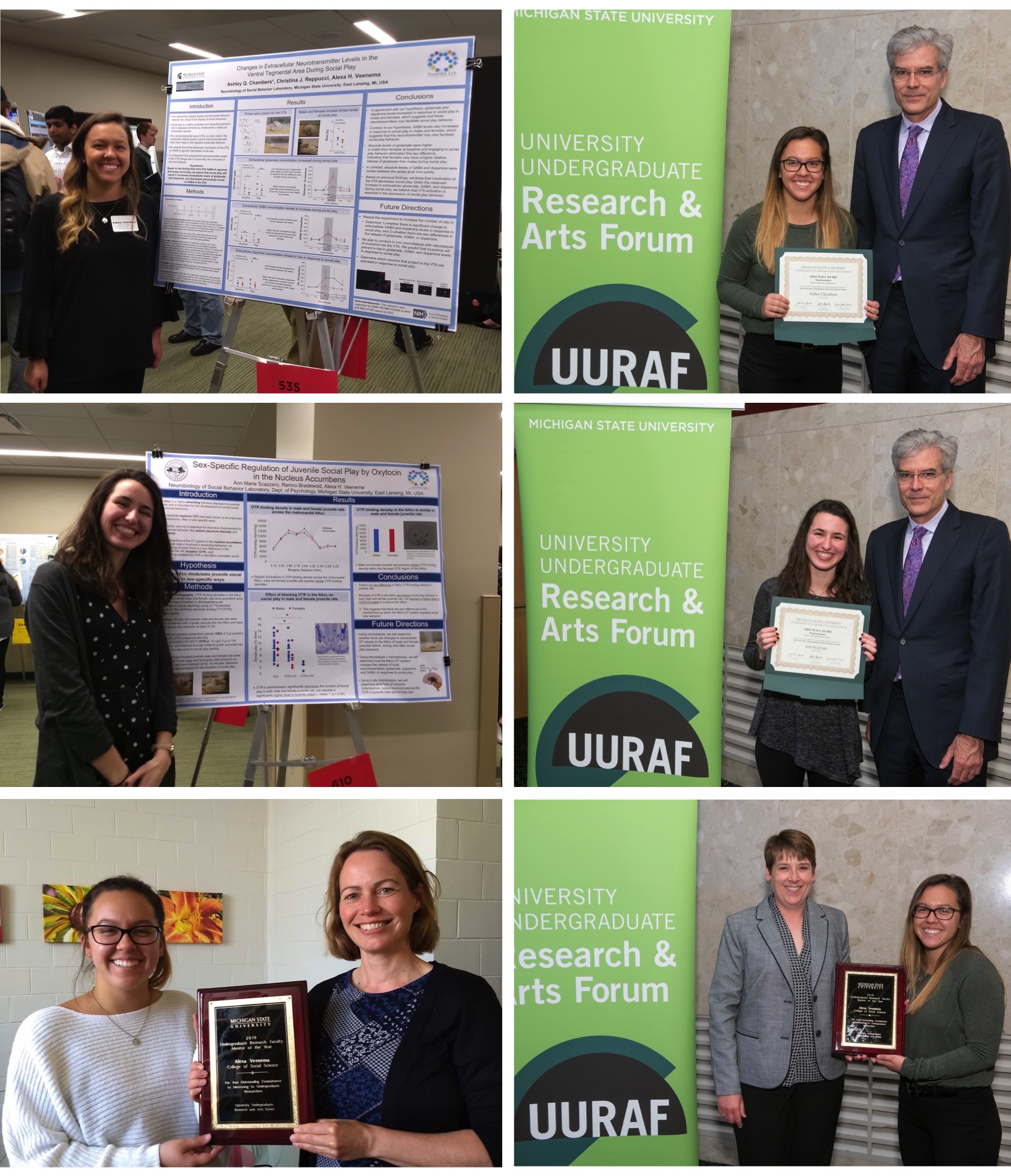
Remco presented a poster and Alexa chaired the symposium “Neuronal networks and brain circuits of the oxytocin and vasopressin systems” at the 13th World Congress on Neurohypophysial Hormones that took place on April 8-11 at the Ein Gedi resort, the Dead Sea, Israel. Speakers were Drs. Joanna Dabrowska, John Christianson, Alex Ophir, and Yevgenia Kozorovitski.
March 2019
Dr. Bita Moghaddam from the Oregon Health & Science University gave a talk on March 28th in the MSU Neuroscience Program Seminar Series.
February, 2019
Caroline, Brett, and Alexa published a review paper in the journal Frontiers in Neuroendocrinology (Title: Comparing vasopressin and oxytocin fiber and receptor density patterns in the social behavior neural network: Implications for cross-system signaling). Caroline and co-authors demonstrate the potential for cross-system signaling in the medial amygdala, bed nucleus of the stria terminalis, medial preoptic area, and periaqueductal grey. Interestingly, vasopressin fiber and oxytocin receptor binding densities in the medial amygdala and ben nucleus of the stria terminalis show similar sex (higher in males versus females) and age (higher in adults versus juveniles) differences suggesting that cross-system signaling may facilitate sex- and age-specific expression and/or regulation of social behavior. These findings provide evidence for the potential of complex interactions between these two neuropeptide systems. If these findings translate to humans, this may have consequences for how these neuropeptides are used in the clinic to treat social dysfunction.
Alexa gave a talk on February 7th in the Neuroscience seminar series at Bucknell University.
January 2019
Alexa gave a talk on January 19th in the weekly seminar series of the Neuroscience Program at the University of Illinois at Urbana-Champaign.
